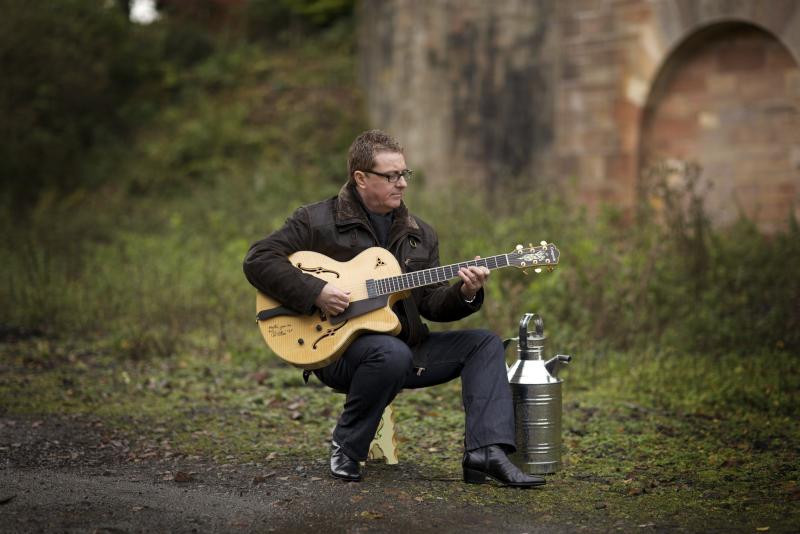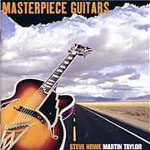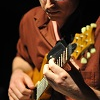Home » Jazz Articles » Interview » Martin Taylor: Embodying the Spirit of Django
Martin Taylor: Embodying the Spirit of Django

In 2010, Taylor expanded his musical palette yet again by launching the Martin Taylor Guitar Academy, an online music school run by the British guitarist. Students from all over the world can now study with the master guitarist, all from the comfort of their own homes. Each lesson, which is part of a larger curriculum designed by Taylor, is presented as a video on the site, in a somewhat similar fashion to an instructional DVD. How the site differs from normal DVD lessons is that students can videotape themselves performing the exercises from each lesson, and post them on the site for Taylor to critique and for other students to view and learn from.
This added level of interactivity allows the site to offer students a personal touch from Taylor as he works with them through problems, offers encouragement and guides them through each concept and exercise. For the price of a one-off lesson with a local guitarist, students can have access to all of the site's material for three months at a time. With the site's initial success, and that of similar sites hosted by Andreas Oberg and Jimmy Bruno, it seems like this may be signaling a new frontier for guitar education worldwide.
In recognition of his lifetime of commitment to the guitar, jazz, and music in general, the Royal Scottish Academy of Music and Drama announced in 2010 that they would bestow an honorary Doctorate degree on Taylor, the first such award given to a guitarist. Though Taylor will be the first to deflect attention away from himself for such an award, being more humble than his talent dictates, the Academy couldn't have picked a more deserving guitarist, educator and musical ambassador for this award.
All About Jazz: With your band, the Spirit of Django, being inspired by the music and life of Django Reinhardt, it seems to reason that he's had a big influence on your performing career. Django is one of those players that means different things to different people. What does Django's music mean to you on a personal and professional level?
Martin Taylor: It's the music that I grew up with, because that was the music my dad was playing around the house, and Django became the reason that I began playing guitar in the first place. For me, compared to the other guitar players that I heard at the time, there seemed to be an incredible connection between myself and his music. The best way I can describe it is that it felt like he was talking to me. Looking back at it now, I think it's because he was such a melodic player and improviser—that's the side of his playing that grabbed a hold of me.
Though he inspired me to play the guitar, to be honest, I never really played in that style. I was more into the American players like Barney Kessel, Tal Farlow, Johnny Smith, guys from that school of playing— that's really where my roots are. Even when I played with Stephane Grappelli, we never really played Hot Club music. We would play a couple of tunes that were in that realm, but we never played in that style.
 AAJ: Did playing with Stéphane inspire you to form the Spirit of Django ensemble?
AAJ: Did playing with Stéphane inspire you to form the Spirit of Django ensemble? MT: It was slightly after I had played with Stéphane that I started the Spirit of Django group because I felt that I wanted to explore this music further. I was also fascinated with Django the person, not just Django the player. When you hear his family talk about him, they describe him as being a very modern man. I started to wonder if he was alive now, what type of music would he be playing. Even during his lifetime, you can hear him transitioning into a new direction with his music, away from his earlier style of playing. When I recorded the first Spirit of Django record we did a Pat Metheny tune, because I'm sure if he was alive today he'd be a fan of Pat's music.
AAJ: Since Django had such a strong influence on you while you were growing up, how much formal study of his music did you do? Were you transcribing his solos and chord work, or was it more a matter of just listening and absorbing his style aurally?
MT: I learned by listening and absorbing the music because I didn't really have any formal music training. I didn't take any lessons or have any formal music education. I would just listen to his records, and I found that when I was away from the music I could still recall it in my mind and sing those solos and melodies that he played. Even when I was a kid in school, his music would be going through my mind all day.
When I started to pick up the guitar, I found that I could work out some of his phrases just by ear. When I became more proficient on the guitar, I found that I was incorporating his ideas into my soloing sometimes without even thinking about it. I used a lot of what I heard Django doing to kind of unravel the mysteries of improvisation. I learned about music by working out some of the things that I heard Django do in his playing.
AAJ: Going back to something you said earlier, about how you recorded a Pat Metheny piece because you thought that Django would have been a fan of his music—one of the things that stands out on Last Train to Hautville (The Guitar Label, 2010) is the diversity of musical genres that come together within the context of the gypsy jazz aura that surrounds the album. Did you bring these other genres into the fold consciously, or is that just how things worked out when the light went on in the studio?

MT: It just felt very natural to do it that way. When I was writing the music, I came up with the melodies first, and then I found that some of them worked better with different grooves, like a bossa nova, as opposed to the four-to- the-bar, Django-style rhythms. I think that these newer kind of grooves are something that Django would have embraced, had he lived in our era. Even though I bring in those Gypsy-Django inflections to my music, I don't actually play in that strict, Gypsy-Jazz style of improvisation.
I'm coming from more of a Bebop background, which is the style that Django was moving towards near the end of his life. So my improvisations are more Bebop- oriented than that arpeggio-based playing that most of the Django-style players use. I try and bring those Django-based inflections into my playing, but I'm never really trying to imitate his lines or note choices in my solos.
AAJ: Since you've got a busy schedule of solo concerts and have recently launched an online teaching website, do you have any plans to take the Spirit of Django out on the road, or is that even possible with your current schedule?
MT: We're not touring, as such. What we're doing is playing summer festivals, mostly in the U.K. and around continental Europe. Everyone in the band is really busy as well, so it's hard to get our schedules all lined up so we can go out on the road. We usually do about four or five days at the most in a row, but it'll probably be mostly one-off dates, that sort of thing.
As well, Jack Emblow the accordion player is 80 years old. He's retired, and I kind of dragged him out of retirement for these gigs, but he's really into gardening and doesn't like to be away from his garden very much, so it's hard to get him on the road. [Laughs] We're just being very selective with the gigs that we do— mostly festival dates. The music is very festive in nature, very summery music. It's music that seems to lift people's spirits and I think it goes well with an outdoor, summer festival atmosphere, so those are the gigs we're focusing on right now.
AAJ: In 2010, you launched the Martin Taylor Guitar Academy, which is an online subscription based teaching website. The site has been going strong since its launch, including signing up players from 15 countries in the site's first week on the web. With all that you're doing with your publications, touring, recording and teaching clinics, why did you feel that 2010 was the right time to get into the online teaching world with the new site?
MT: Well, I think really it was the technology—the fact that it's now possible to do this and to have a high level of interaction with the students. It's not a DVD or online video that the students just watch; it's much more interactive than that. There is a curriculum that the students work through, and the students can submit videos of themselves playing that are posted on the site for everyone to see. Then I reply to those videos, which also go up on the site alongside the students' videos.
Even though there's an underlying curriculum, when the students submit video responses we go into more depth on certain topics, which means that the site is always growing, it's not static. People can also ask questions, and I can address specific details like that—something that I couldn't do with a DVD or book or other static mediums.
AAJ: Besides doing one-off clinics, have you ever taught on a regular basis like this before?
MT: I've never really taught before, but a couple of years ago I started doing some mentoring sessions with more advanced students that found themselves in a rut and needed a bit of a push with their playing. It ended up being more psychology than teaching. I ended up fixing their heads more than their playing. [Laughs.]
When I started teaching, I had to go back and really break down what it is I do as a player, which is something I'd never really thought about. After dissecting my playing, I came up with a method of how I play, and am now trying to convey that method to the students on the site.
AAJ: How did coming up with that method affect your teaching approach? MT: Well, I found that a lot of students learn the guitar based around chords shapes and grips—that sort of thing. But when they try to expand their playing beyond that sort of beginner level, they find that they're stuck in these shapes and don't know where to go from there. What I've found is that if I can get them to stop thinking like a guitarist, and start thinking like a musician, then I can help guide them to the next level in their playing.
MT: Well, I found that a lot of students learn the guitar based around chords shapes and grips—that sort of thing. But when they try to expand their playing beyond that sort of beginner level, they find that they're stuck in these shapes and don't know where to go from there. What I've found is that if I can get them to stop thinking like a guitarist, and start thinking like a musician, then I can help guide them to the next level in their playing.
Don't think of the shapes as being related to the chord, and dictating their note choices on that chord, let's look at how the chord is built instead. Why is it called a C7? If they can play a C7 in one position, can they do it in another? What inversions do they know for that chord or for any chord? I really try and break things down to their basic elements in these lessons.
If we can break things down and start to understand how harmony works, how notes relate to each other, then we can really make progress. So far, I've had quite a few successful patients, so it seems to be working. [Laughs.] I've even had guitarists come to me that were thinking about giving up, about stopping playing, and I would give them something very simple—just a different view on the material they already knew, and it's amazing how much something so small can help a player get out of a rut sometimes.
I feel that I've gotten to a point in my life that I really want to give back, and this method is the perfect way to do it. I've had students come to me in person for an hour-long lesson, but with the website they can get so much more out of it— definitely more then we can cram into one hour.
AAJ: There is also a community element to the site, isn't there?
MT: Yes, there's a forum where all the students can hang out and learn from each other, discuss lessons and ideas, that sort of thing. It's kind of like what goes on with social networking sites like Facebook and MySpace. It makes for a great community environment. The other cool thing is that I've recently been in talks with the Royal Scottish Academy of Music and Drama, and they are interested in perhaps looking into a similar setup to help teach the students at their academy and beyond. 
It's such a great way to reach a large number of people, without any regards to time zones or location. As long as someone has access to the internet they can access the site 24 hours a day from anywhere in the world. It's truly an amazing thing, and I'm really glad to be a part of it.
AAJ: Speaking of the Royal Scottish Academy of Music and Drama, in 2010 you were awarded an honorary Doctorate degree from the Academy. What does that mean to you, as a person and as a player, to be honored by one of the top music schools in the U.K.
MT: It means a lot to me because the Academy is a very important place in Scottish music—probably the most important institution here. For the people at the Academy to think that I've done well enough with my career to bestow this award on me is very humbling, and I really appreciate it. It's also the first time that they've given this honor to a guitarist, which is great for the instrument as well.
To me, it's more about honoring the music, about recognizing jazz guitar, which is an important thing for the instrument and the genre. We, as players all know how important this instrument and music is to us, but sometimes it can go unnoticed by the larger community, so I think this is a great thing for the guitar and for jazz music as well.
Selected Discography
Martin Taylor's Spirit of Django, Last Train to Hautville (The Guitar Label, 2010)
Alison Burns, Kissing Bug (The Guitar Label, 2008)
Martin Taylor, Double Standards (P3 Music, 2008)
Martin Taylor, Fraternity (The Guitar Label, 2007)
Martin Taylor, The Best of Martin Taylor (The Guitar Label, 2006)
Steve Howe/Martin Taylor, Masterpiece Guitars (P3 Music, 2003)
Martin Taylor, Solo (The Guitar Lablel, 2002)
Martin Taylor, Nitelife (Columbia, 2001)
Martin Taylor, In Concert (Fantasy, 2000)
Martin Taylor, Kiss and Tell (Columbia, 1999)
Martin Taylor's Spirit of Django, Gypsy (Linn Records, 1997)
Photo Credit
All Photos: Courtesy of Martin Taylor
< Previous
Remembrance
Next >
Opening
Comments
Tags
For the Love of Jazz
 All About Jazz has been a pillar of jazz since 1995, championing it as an art form and, more importantly, supporting the musicians who create it. Our enduring commitment has made "AAJ" one of the most culturally important websites of its kind, read by hundreds of thousands of fans, musicians and industry figures every month.
All About Jazz has been a pillar of jazz since 1995, championing it as an art form and, more importantly, supporting the musicians who create it. Our enduring commitment has made "AAJ" one of the most culturally important websites of its kind, read by hundreds of thousands of fans, musicians and industry figures every month.






















